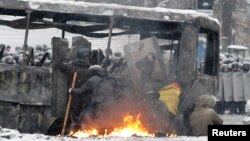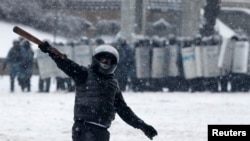Officials in Ukraine have confirmed three anti-government protesters have died in the capital, Kyiv, in new clashes with police.
Two protesters were reported to have gunshot wounds. A medical official said another activist fell to his death at the site of the clashes.
Reports indicate the police were trying to dismantle a protest camp in Kyiv Wednesday and fired tear gas at demonstrators, who responded by hurling stones and homemade explosives at police.
The U.S. embassy in Kyiv said in a statement Wednesday that it has revoked the visas of several Ukrainian nationals linked to the violence. The names of those Ukrainians were not released.
Also on Wednesday the European Union's foreign policy chief, Catherine Ashton, urged "an immediate end" to the escalating violence. After the reports of deaths, she "strongly" condemned the violence.
On Tuesday, Ukrainian prime minister Mykola Azarov had warned the protesters that authorities might use force. Azarov told Russia's Vesti 24 television that if those he called "provocateurs" did not stop inciting clashes, officials would have no other choice.
He said he hopes common sense will prevail and that many issues can be resolved at the negotiating table.
Anti-government protesters marched through Kyiv for a third straight day Tuesday. Fighting between police and demonstrators has injured hundreds.
Ukrainians took the streets in response to President Viktor Yanukovych's decision in November to back out of a plan to sign a trade deal with the European Union in favor of closer ties with Russia.
At their peak late last year, protests in Ukraine’s capital, Kyiv, were drawing hundreds of thousands of people.
Rallies grew in size again last week when pro-Yanukovych lawmakers in parliament hastily passed restrictive anti-protest laws, which have been condemned by a number of Western governments as undemocratic.
Yanukovych has formed a working group of government representatives to meet with opposition leaders to address their grievances. The opposition demands to negotiate with Yanukovych directly.
Meanwhile, Moscow, Ukraine’s former Soviet overlord, has blamed elements in Ukraine’s opposition for the latest violence in Kyiv, accusing them of acting against European norms. Commenting on the situation in Ukraine, Russian Foreign Minister Sergei Lavrov said it is "spinning out of control." He added that Russia will do everything it can to help "stabilize the situation" without meddling in Ukrainian domestic affairs.
In Washington, the U.S. Broadcasting Board of Governors expressed outrage over bloody police attacks on dozens of journalists in Kyiv, including RFE/RL reporter Dmytro Barkar and cameraman Ihor Iskhakov. They were covering the protests on Monday when they were beaten and struck on the head by members of the elite Berkut police force.
Two protesters were reported to have gunshot wounds. A medical official said another activist fell to his death at the site of the clashes.
Reports indicate the police were trying to dismantle a protest camp in Kyiv Wednesday and fired tear gas at demonstrators, who responded by hurling stones and homemade explosives at police.
The U.S. embassy in Kyiv said in a statement Wednesday that it has revoked the visas of several Ukrainian nationals linked to the violence. The names of those Ukrainians were not released.
Also on Wednesday the European Union's foreign policy chief, Catherine Ashton, urged "an immediate end" to the escalating violence. After the reports of deaths, she "strongly" condemned the violence.
On Tuesday, Ukrainian prime minister Mykola Azarov had warned the protesters that authorities might use force. Azarov told Russia's Vesti 24 television that if those he called "provocateurs" did not stop inciting clashes, officials would have no other choice.
He said he hopes common sense will prevail and that many issues can be resolved at the negotiating table.
Anti-government protesters marched through Kyiv for a third straight day Tuesday. Fighting between police and demonstrators has injured hundreds.
Ukrainians took the streets in response to President Viktor Yanukovych's decision in November to back out of a plan to sign a trade deal with the European Union in favor of closer ties with Russia.
At their peak late last year, protests in Ukraine’s capital, Kyiv, were drawing hundreds of thousands of people.
Rallies grew in size again last week when pro-Yanukovych lawmakers in parliament hastily passed restrictive anti-protest laws, which have been condemned by a number of Western governments as undemocratic.
Yanukovych has formed a working group of government representatives to meet with opposition leaders to address their grievances. The opposition demands to negotiate with Yanukovych directly.
Meanwhile, Moscow, Ukraine’s former Soviet overlord, has blamed elements in Ukraine’s opposition for the latest violence in Kyiv, accusing them of acting against European norms. Commenting on the situation in Ukraine, Russian Foreign Minister Sergei Lavrov said it is "spinning out of control." He added that Russia will do everything it can to help "stabilize the situation" without meddling in Ukrainian domestic affairs.
In Washington, the U.S. Broadcasting Board of Governors expressed outrage over bloody police attacks on dozens of journalists in Kyiv, including RFE/RL reporter Dmytro Barkar and cameraman Ihor Iskhakov. They were covering the protests on Monday when they were beaten and struck on the head by members of the elite Berkut police force.
Some information for this report was provided by AP and Reuters.






